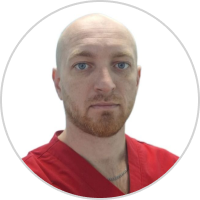Specialists
Years of experience in genetics, laboratory diagnostics and bioinformatics
About 5% of CRC cases are hereditary.
Factors that make it possible to suspect a genetic contribution to the development of CRC.
For individuals with a quantitative risk of 2.5% or higher on PREMM, genetic testing for Lynch syndrome is recommended.
There are 3 subtypes of FAP:
Years of experience in genetics, laboratory diagnostics and bioinformatics
All data is strictly confidential and cannot be passed on to third parties
Results ready in a short time
Extensive control at each stage of testing
Free delivery of biomaterial across Russia
Email info@f-genetics.com for information

Шикеева Амуланг Алексеевна
Врач-генетик, лабораторный генетик Лаборатории First Genetics, к.м.н.

Филатов Павел Николаевич
Врач-онколог, химиотерапевт высшей категории, хирург ГАУЗ «ООКСЦТО» Действительный член Российского общества клинической онкологии (RUSSCO), Ассоциации онкологов России (АОР), профессионального сообщества Меланома Про.